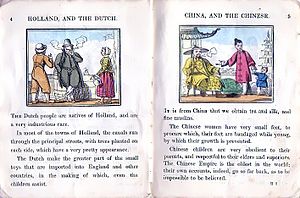Our website is made possible by displaying online advertisements to our visitors.
Please consider supporting us by disabling your ad blocker.
Mores

Mores (/ˈmɔːreɪz/, sometimes /ˈmɔːriːz/;[1] from Latin mōrēs [ˈmoːreːs], plural form of singular mōs, meaning "manner, custom, usage, or habit") are social norms that are widely observed within a particular society or culture.[2] Mores determine what is considered morally acceptable or unacceptable within any given culture. A folkway is what is created through interaction and that process is what organizes interactions through routine, repetition, habit and consistency.[3]
William Graham Sumner (1840–1910), an early U.S. sociologist, introduced both the terms "mores" (1898)[4] and "folkways" (1906) into modern sociology.[5][6]
Mores are strict in the sense that they determine the difference between right and wrong in a given society, and people may be punished for their immorality which is common place in many societies in the world, at times with disapproval or ostracizing. Examples of traditional customs and conventions that are mores include lying, cheating, causing harm, alcohol use, drug use, marriage beliefs, gossip, slander, jealousy, disgracing or disrespecting parents, refusal to attend a funeral, politically incorrect humor, sports cheating, vandalism, leaving trash, plagiarism, bribery, corruption, saving face, respecting your elders, religious prescriptions and fiduciary responsibility.[7]
Folkways are ways of thinking, acting and behaving in social groups which are agreed upon by the masses and are useful for the ordering of society. Folkways are spread through imitation, oral means or observation, and are meant to encompass the material, spiritual and verbal aspects of culture.[8] Folkways meet the problems of social life, we feel security and order from their acceptance and application.[9] Examples of folkways include: acceptable dress, manners, social etiquette, body language, posture, level of privacy, working hours and five day work week, acceptability of social drinking—abstaining or not from drinking during certain working hours, actions and behaviours in public places, school, university, business and religious institution, ceremonial situations, ritual, customary services and keeping personal space.[10]
- ^ "mores". The American Heritage Dictionary of the English Language (5th ed.). HarperCollins.
- ^ Macionis, John J.; Gerber, Linda Marie (2010). Sociology (7 ed.). Pearson Education Canada. p. 65. ISBN 9780138002701.
- ^ Crossman, Ashley. "Folkways, Mores, Taboos, and Laws". www.thoughtco.com. Retrieved 5 June 2022.
- ^ "mores". Oxford English Dictionary (Online ed.). Oxford University Press. (Subscription or participating institution membership required.) - "Professor Sumner:-..Systematic Societology..knowledge and pseudo-knowledge, world philosophy, otherworldliness, industrial theories, mores, codes, mental training, traditional wisdom."
- ^ Macionis, John J.; Gerber, Linda Marie (2010). Sociology (7 ed.). Pearson Education Canada. p. 65. ISBN 9780138002701.
- ^ Sumner, William Graham (1906). Keller, Albert Galloway (ed.). Folkways: A Study of the Sociological Importance of Usages, Manners, Customs, Mores, and Morals. Ginn. pp. 692.
- ^ Drew, Chris (3 January 2022). "27 Examples Of Morals & Ethics (A To Z List)". helpfulprofessor. Retrieved 5 June 2022.
- ^ Campbell, Henry (1995). Black's Law Dictionary. USA: Manhattan: Manhattan: West Publishing. ISBN 1886363102.
- ^ "The Sanction of Folkways". www.sociologyguide.com. Retrieved 5 June 2022.
- ^ "Folkways in Sociology Meaning Definition with Example". studylecturenotes.com. 9 September 2014. Retrieved 5 June 2022.
Previous Page Next Page


